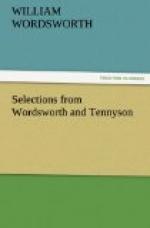XXVII
“The very memory of such an affection as he had cherished for Hallam is an inspiration. Keen and acute as the sense of loss may be, it purifies rather than destroys the influence of a hallowed love—its effect is to idealize and sanctify. This general truth is enforced by several illustrations.”—Henry E. Shepherd.
2. NOBLE RAGE. Fierce love of freedom.
6. HIS LICENSE. “Lives without law, because untroubled by the promptings of a higher nature.”
6. FIELD OF TIME. The term of his natural life.
12. WANT-BEGOTTEN REST. Hallam, Lord Tennyson interprets: “Rest—the result of some deficiency or narrowness.”
16. NEVER TO HAVE LOVED. Life is enriched by the mere act of having loved.
LXIV
“Still brooding on all the possible relations of his old friend to the life and the love that he has left, the poet now compares him to some genius of lowly birth, who should leave his obscure home to rise to the highest office of state, and should sometimes in the midst of his greatness, remember, as in a dream, the dear scenes of old, and it may be, the humble villager who was his chosen playmate.”—Elizabeth R. Chapman.
1. DOST THOU, ETC. This section was composed by Tennyson when he was walking up and down the Strand and Fleet Street in London.
5. INVIDIOUS BAR. Obstacle to success. Invidious is used in the sense of “offensive.”
7. CIRCUMSTANCE. Adverse circumstances.
9. BY FORCE. Strength of character and will.
10. GOLDEN KEYS. Keys of office of state.
11. MOULD. As a minister of the Crown.
14. CROWNING SLOPE. A felicitous phrase. If it were a precipice it could not be climbed.
15. PILLAR. That on which they build, and which supports them.
21. NARROWER. When he was still in his “low estate.”
28. REMEMBER ME. Bradley notes that “the pathetic effect is increased by the fact that in the two preceding stanzas we are not told that his old friend does remember him.”
LXXXIII
“With the dawning of the New Year, fresh hope quickens in the poet’s breast. He would fain hasten its laggard footsteps, longing for the flowers of spring and for the glory of summer. Can trouble live in the spring—the season of life and love and music? Let the spring come, and he will sing ‘for Arthur a sweeter, richer requiem.’”—Elizabeth R. Chapman.
1. NORTHERN SHORE. Robertson explains: “The north being the last to be included in the widening circle of lengthening daylight as it readies further and further down from the equator.”
2. NEW-YEAR. The natural, not the calendar year. The re-awakening of life in nature.




